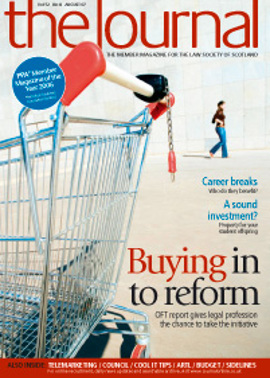Holyrood - Scotland's voice in Europe?

It has become a political truism that, despite devolution, the majority of laws being passed in Scotland now originate in Europe – the figure of 70% is often quoted. As the new SNP administration has placed EU issues high up its agenda, this is an interesting moment to examine Scotland’s position in relation to the EU, rather than simply the rest of the UK.
It is a highly politicised environment which underpins the complexities of decision-making in Brussels: national governments, the European Parliament and the Commission all wield significant powers over the adoption of legislation. A new EU reform treaty has just been agreed by heads of government, including the British Prime Minister but not Scotland’s First Minister. Nations, such as Scotland, are often obliged to compete with other such “regions” by lobbying – at national and EU level – to have their views taken into account. Recent initiatives to bolster the role of national parliaments in EU decision-making do not apply to such sub-national bodies.
Therefore how does a country like Scotland make its voice heard, and what is its legitimate voice?
Diverse engagement
Speaking recently in Brussels, Scotland’s new First Minister, Alex Salmond MSP, said: “For a nation with a devolved Parliament, there is perhaps an inherent temptation to defer rather than to lead. In a European Union of nations and regions it is easy to assume the role of an interested if peripheral observer. I therefore want to be clear from the outset that as First Minister of Scotland I have no confusion or prevarication. The peoples and institutions of the European Union are central to my vision for Scotland.”
Engaging positively with EU decision-making is not, however, a new concept. Depending on the subject-matter, many can take on the role of speaking for Scottish interests, including local authorities, business interests, professional bodies and other organisations.
The Society, for its part, plays an active role in discussions on the reform of law and professional practice issues in Europe, just as it does domestically. Its Law Reform Department comments on policy proposals, gives evidence and proposes amendments to legislation in a wide variety of areas. As the scope of EU activity has broadened to take in criminal law, family law and succession, on top of the more traditional sectors such as trade, employment or intellectual property, the Society’s work, through its Brussels office, is increasingly focused on influencing Brussels machinery.
Scotland marginalised?
At least on the face of it, it is not difficult to ascertain what the Scottish Executive’s role is. In devolved matters it has to represent the Scottish position in the formulation of UK Government policy and in UK dealings with the EU institutions. Contrary to the perception of certain elements of the media, national governments still play the primary role in agreeing new EU legislation. Scottish ministers often attend EU ministerial meetings, but rarely would they speak for the UK position. So, while the Executive engages directly with the EU institutions, its success or failure lies greatly in its ability to persuade the UK Government of its arguments.
As was reported widely in the media in January this year, even the head of the Executive’s own EU Office in Brussels complained, in an internal report, that Scotland’s interests were often not considered or reflected sufficiently in the UK position, particularly where there was a distinct Scottish perspective. To avoid Scottish views being ignored or marginalised, especially in areas of devolved competence or where Scots law is distinct to the law in England, strenuous efforts must be made. Under the current devolution settlement, however, it remains to be seen how Scottish ministers could play a greater role in EU Council meetings or shaping UK Government policy. It will be interesting to see whether this new Executive will have less regard for UK Government policy (or sidestep it) when pushing the Scottish line in Brussels.
The Parliament: finding a role
But what role should a devolved parliament take, if its members are concerned with actively protecting Scotland’s interests? Indeed is there such a thing as the Scottish interest? Should the Parliament be seen to be backing up its Executive in the European political arena? Should it submit evidence or lobby the EU institutions of its own volition?
It has always been recognised that the Parliament would have to grasp the nettle of Europe, not least because of the “70%” factor, and the European and External Relations Committee is a mandatory part of the Parliament’s setup. Parliamentary committees question ministers and civil servants on European negotiations and have arranged with the Executive a programme of reporting to committees on government-level discussions in the Council of Ministers.
However, because of what the committee has referred to as the “sheer volume” of legislation and proposals for legislation, it has had to look at a variety of methods of sifting and focusing on relevant issues. The Parliament has put in place a number of arrangements to allow the most efficient analysis of proposals emanating from the EU, principally by “mainstreaming” different issues to subject-area committees, to be considered along with domestic matters. Some committees developed quite an expertise in European issues during the last session. The Justice Committees also stepped into the fray, commenting on proposals relating to divorce and matrimonial property, and taking evidence from Commission officials by video link on possible changes to succession law. Their interventions were well received and they had some success with their views on family law. Committee visits to the institutions in Brussels have also helped to establish links and raise the profile of the Parliament’s interest in EU issues.
But MSPs could still do well to learn from their Westminster cousins. The House of Lords in particular takes a strategic approach to scrutinising EU issues, devoting time and resources to its inquiries, and holding ministers to account. Its reports on EU initiatives are highly regarded on both sides of the Channel because of their quality and considered nature.
Obstacles to effectiveness
There does appear to be a role for the Scottish Parliament to engage its constituency, business and the citizen, in the EU policy process and in some cases represent the overarching Scottish view. Engagement with the Parliament in Edinburgh is, for most, a more feasible option than lobbying the Commission. The Parliament has shown that it can serve as a forum for debating EU issues and influencing policy. However, one issue emphasised in the last European Committee’s report on implementing EU legislation, is that both the Parliament and the Executive need to engage better at policy formation stage with those who will be affected by legislation. Without such engagement, there is a danger of a policy vacuum and that potential problems go unheeded until implementation, which is often too late.
That said, it is often difficult for a body such as the Parliament to arrive at a consensus on an issue. And if it does, what effect will this have? Engaging in the EU policy process effectively, even on one single issue, requires time and resources. The Parliament has one official in Brussels providing information and intelligence to MSPs on initiatives. Even industry representatives in Brussels, with more restricted remits and interests, may often have more than one member of staff dedicated to the role.
Quite correctly, the work of MSPs is also dominated by the domestic agenda. Maintaining a commitment to engage effectively with EU matters is difficult in the face of the somewhat overwhelming Scottish legislative agenda which characterised the Parliament’s first eight years. It may be that, as is widely predicted, a minority administration will not be in a position to legislate at that rate, and committees will have greater opportunities to assess their own priorities, but that remains to be seen.
MSPs need also to be able to arrive at their own position based on their own views and those of their constituents, and importantly their party. Yet, it is questionable whether MSPs, MPs and MEPs, whether within each party or cross-party, are always singing from the same hymnbook. Scotland has seven MEPs, elected to represent the constituency of Scotland. While they are well plugged in to the EU apparatus, representing Scottish interests is an overwhelming task with each of the main parties having only one or two MEPs. Greater cross-party co-operation might lighten the load for everyone and enhance the understanding of EU issues in a devolved Scottish context.
Time to prioritise
So far, the success of Scottish initiatives to co-ordinate on European issues, such as EMILE (the European elected Members Information Liaison Exchange), is less than obvious. Ideas discussed in Westminster to create a committee composed of MEPs, MPs and peers could also be considered in the Holyrood context. The world of politics is, however, a world of personalities. With the best intention, no bureaucratic structure alone is going get politicians working together effectively. It takes genuine political commitment and effort and an ability to set aside political rivalry.
The constitution of the newly elected Parliament may offer MSPs an opportunity to reflect on priorities and on the most effective way of shaping policy. It may also offer the opportunity to set realistic priorities. And by “realistic”, one should remember that devoting time to EU issues will likely win MSPs and ministers little credit with the electorate, with the exception of high-profile issues like fisheries. Only greater popular awareness of the importance of issues, such as proposed changes to the laws on divorce or succession, will spur on MSPs to act, and to act effectively.
In summary, as with many questions relating to the Scottish Parliament and the devolved administration, time will provide the opportunity for policy and practice to develop. Since 1999, the Parliament has arguably taken some great leaps forward in how it deals with EU issues. In many ways, however, it is still finding its feet. If it wants to take a more central role in representing Scottish views on the Brussels stage and properly fulfil the mandate to examine the work of the Executive, this is an area which needs to be carefully considered and given greater priority.
Improved engagement with stakeholders, both in formulating policy and when implementing legislation; better awareness by MSPs of how the EU works and the importance of EU matters, added to more co-ordination with European and Westminster colleagues; and adequate resources for the Parliament and Executive to produce an effective Scottish response to such important issues, are all required.
- Sarah Fleming, Head of International Relations, Law Society of Scotland
- Andrew Laidlaw, Internal Market Policy Adviser, Brussels Office
In this issue
- EAT breaks ground with TUPE insolvency ruling
- Top of the agenda
- Shaping a humane law
- Checkout the debate
- Family cases: another view
- A home of their own
- Break time
- Budget under the bonnet
- Holyrood - Scotland's voice in Europe?
- Ringing within the rules
- Cool IT for hot lawyers
- Future perfect?
- Case that makes the heart leap
- Green about the edges
- An eye on expenses
- The tail in the nail or ponytail
- Off on the right foot
- Scottish Solicitors' Discipline Tribunal
- Website reviews
- Book reviews
- Well drilled
- Good neighbour agreements - bad law?
- One small step for ARTL...
- Contaminated land: a reminder and a warning
- Contaminated land: a reminder and a warning (1)
- SFP: a tough call






